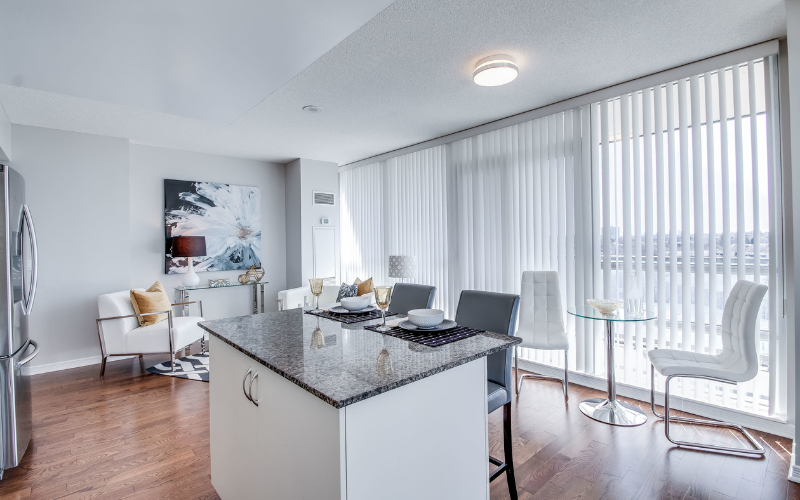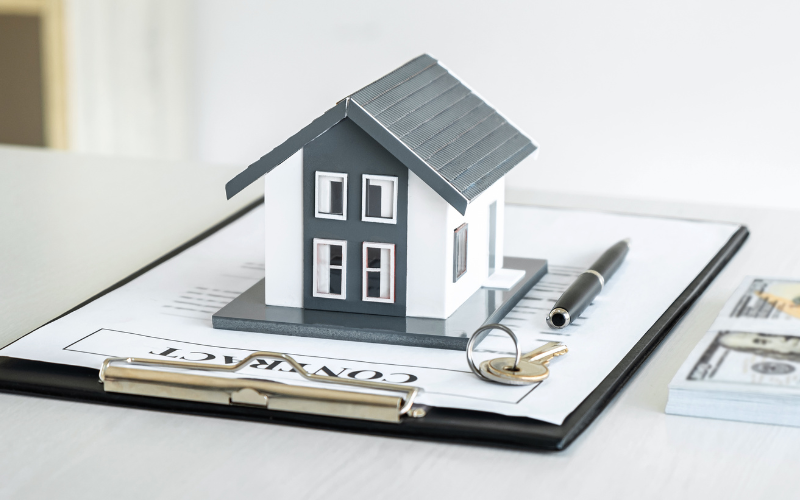Student loan debt; the gift that keeps on giving and probably will for generations to come.
Being saddled with student loan debt has hurt the millennial generation and many would-be first-time home buyers. Our generation is forced to figure out how to balance paying off our cancerous debt before it consumes us with our desire for homeownership.
We all went to college so that we could live a better life than our parents. We spent some hard years in college so that we could do this whole #adulting thing and own a home, start a family, travel the world.
But our student loan debt is holding us back.
Today, I’m going to share some tips and key factors to help you decide if paying off your student loan debt or buying a house is the right option for you.
Can You Afford To Buy A House?
The key questions you need to ask yourself before you start exploring which option is best, is whether you have enough money for the required down payment, plus closing costs, and if you feel like you can handle — NOT what the bank or lender says you can handle — all associated housing costs such as, the mortgage, taxes, and utilities.
To buy a home, you will need more than your down payment. First-time home buyers are often surprised by extra cash expenses that they didn’t account for.
It’s not your fault. Our industry makes it difficult to get an understanding of what your out-of-pocket expenses will be. Most articles and tips only focus on the down payment. If you’re lucky, you might find an article that mentions the costs to get a mortgage.
But there are four main expense categories that you will need to take care of before you can get the keys to your home.
- Your Down Payment
- Your Closing Costs and Lending Costs
- Funding Your Escrow Account
- Miscellaneous and Third-Party Expenses
Let’s explore each of these.
Do You Have the Down Payment?
Forget what you think you might know about down payments… the traditional best-practice of having 20 percent of the home’s value as a down payment is nearly gone. Over the past few years, the median down payment of a home buyer has been about 6 percent, according to the National Association of Realtors.
There are many mortgage programs that require only a 3.5 percent down payment. If you’re lucky enough to qualify for a Veterans Affairs (VA) loan, then you could potentially purchase a home with zero percent down.
The exact down payment you need will depend on the loan program you qualify for and the requirements of the lender.
As the real estate market, and the larger economy, starts to improve, lenders are loosening their requirements. They are allowing buyers to purchase homes with a smaller down payment.
Do You Have Enough For Your Lending and Closing Costs?
Closing costs encompass all of the fees associated with closing on your home. These will vary based on where you plan to buy a home, the lender, and the type of loan you pick. Here is a list of some fees you can expect to pay at the time of closing (in addition to your down payment).
- Application Fee: Includes fees that cover the cost to process your loan application. Some lenders charge this. Others don’t. They might call it a credit check fee or something else. It’s what I call a “junk fee” as there is no real reason for it. This fee can be negotiated and is something you should talk with your lender about. Fee to Expect: $50
- Closing Fee or Escrow Fee: This fee will go to the title company for conducting the closing and handling the paperwork. The title company is an independent party to the transaction and neither represents you or a home seller. Fee to Expect: $450
- Courier Fee: I see this fee often. It covers the cost to mail or transport documents as fast as possible. It’s usually a small fee. Fee to Expect: $40
- Lender’s Title Policy Insurance: Title insurance exists to protect parties in the event that there are any issues with the title. Your lender will require you to take out a lender’s title policy that protects them and ensures the mortgage is a valid lien. Fee to Expect: Varies based on value, location, and risk.
- Loan Discount Points: Points are considered prepaid interest and will lower the overall interest rate on your mortgage. One point is equal to one percent of your loan amount. For example, if you buy one point on a $200,000 mortgage, then the point cost will be $2,000 and it will lower your loan by 1%. Fee to Expect: Varies based on the loan program. Could be $0 to 3% of the mortgage value.
- Origination Fee: Also commonly referred to as origination points. They go toward covering the lender’s administrative costs. Not all mortgage providers charge this fee. It can be negotiated. Fee to Expect: Varies, but typically 1 percent of the loan amount
- Recording Fee: A fee charged by your local recording office of title transfer.
For now, you may have only a general ballpark idea of your costs. To get a more accurate picture, you should talk with a lender. A lender will be able to give you a loan estimate, which will include all of your costs.
But keep in mind that it’s only an estimate. These numbers can change if the underlying assumptions change, like the loan program, where you buy your home, your closing date and more.
Plus not all lenders are created equal. There is the potential for errors in the estimate when working with an unqualified or lazy lender. And when you have little money to spare as it is, being off 5 percent can make a huge difference to your pocketbook.
Whatever your closing costs come out to, understand that many of the costs can be negotiated. For example, you can negotiate the application fee. It’s often easy to get waived. Negotiating can help lower the total costs to close.
For the expenses you can’t lower, you can get them paid for. Through seller’s concessions, a fancy way of saying the seller will pay for some of your closing costs, you could lower the money you need to have in order to buy a home.
Here’s how it works. Let’s say you’re making an offer to buy a home for $150,000. Your out-of-pocket expenses are going to be approximately $18,000 (includes down payment). You ask for 3 percent of the home’s value in seller’s concessions, or $4,500.
That means the seller will cover $4,500 of your $18,000, and your total out-of-pocket expenses will be $13,500.
A loan program that requires a small amount down, combined with negotiating your closing costs and getting some of them paid for, makes the total money to buy a home manageable and possible for home buyers with student loan debt.
Funding Your Escrow
Prior to closing, your lender will require you to fund your escrow account. An escrow account is usually where you will pay your mortgage bill. You will make periodic payments into the escrow account and the bank will withdraw funds to pay for expenses like property taxes and insurance premiums.
It’s common for a lender to require you to bring at least two months worth of property taxes and mortgage insurance at closing. You will likely need to pay for 1 year of your insurance policy at the time of closing.
Lastly, most lenders will require you to prepay any interest that will accrue between closing and the date of your first mortgage payment.
The total cost to fund your escrow account will depend on your lender, your insurance rates, where you buy a home, and your down payment amount. All of this should be calculated on a loan estimate when you formally apply for a loan.
Miscellaneous Third-Party Expenses
The last group of expenses are fees that many buyers are unaware of. Many of these fees will need to be paid before you can close on your home. They include items like a home inspection fee, pest inspection, radon inspection, plumbing inspection, well and septic inspection, and an appraisal fee.
Many of these expenses are not required but recommended. At the very least, you should always get a home inspection. Even the most beautiful homes can have problems with the foundation or inside the walls. A home inspection provides you with a level of safety and protection.
Are You Comfortable With the Monthly Costs?
The second question you need to ask yourself is if you can afford the monthly mortgage payments, associated costs, and your student loan obligations.
Too many first-time home buyers only budget for the mortgage payment. They forget to include taxes, insurances, utility bills, and general maintenance costs.
I tend to call the extra costs phantom costs. These typically total around 50 to 75 percent of your mortgage payment.
For example, if your mortgage payment is $600 a month, you can reasonably expect to have an additional $300 to $450 in expenses.
Make sure to take this into account when trying to figure out if you can afford a home and still pay your student loan obligations. The worst place to be is in a stretched financial position.
So Should You Buy a House Or Pay Off Your Student Loans?
One of my favorite books by Dr. Seuss is The Lorax. The book taught me a big lesson in life: just because you can doesn’t always mean you should.
Maybe you have enough for the down payment and you know you can afford the mortgage payment along with the related expenses. But just because you can buy a home, doesn’t mean you should.
You need to look at your overall financial health and future plans. Paying student loans and a mortgage at the same time can be a burden.
For example, having a mortgage and student loans might make you stay at a job longer than you have to. You may need to pass off on lower paying jobs that would otherwise be fulfilling in life because you need to pay your mortgage and student loans off.
There is something to be said about the flexibility that renting provides. For example, you might decide you want to work for a non-profit in Chicago rather than staying where you are. Living in a home for less than five years can wreck your finances. You will be in a tough spot. Do you wreck your finances or pursue a passion?
Lastly, buying a home will increase your overall debt which could make getting another loan difficult. For example, you may be unable to secure a loan so that you can purchase a new car.
You really need to decide if you’re ready to commit to a home and how much you’re willing to commit — both in time and money. If you plan on living there less than five years or you’re unsure where you will be in the future, you should hold off buying a home.
However, if you’re confident your job is secure and you will be sticking around awhile, then don’t let your student loan debt sway you from the dream of homeownership.
So what should you do? Only you can really answer that. I can give you recommendations and insights from my experience and based on your situation, but only you know what is truly right for you.



